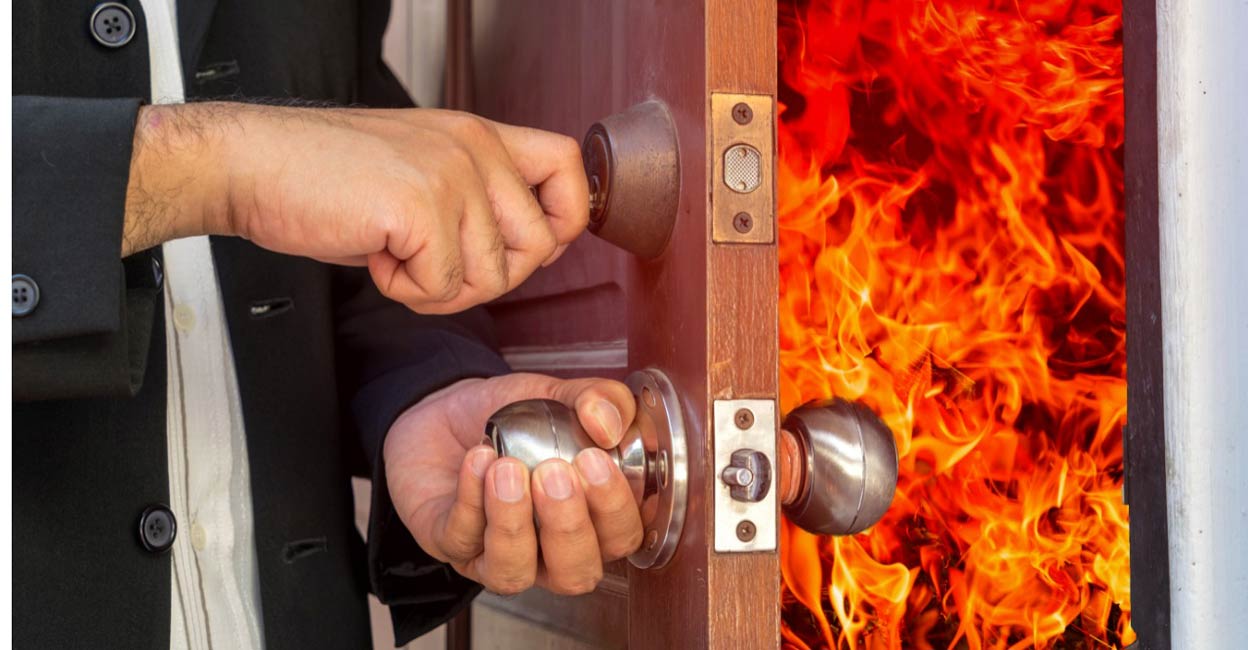How you Use Your Property?
Fire doors are like the superheroes of safety in a fire emergency, but are they a must for your home? Let’s explore the world of fire doors and find out if they’re essential for your peace of mind.
What Are Fire Doors?
First, let’s get familiar with fire doors. They are special doors made to resist fire and smoke. Their main job is to slow down the spread of fire, giving you more time to escape during a fire emergency.
Why Fire Doors Matter
Fire doors are essential for a few key reasons:
● Fire Control: These doors are built to withstand high heat and stop flames from spreading quickly, which can save lives and protect your property.
● Smoke Blockers: Fire doors are great at keeping out smoke, a major danger during fires. By doing this, they keep your escape routes clear.
● Insurance And Safety: In many places, including the UK, rules say that certain buildings must have fire doors. This isn’t just about obeying the law; it’s also important for insurance and safety.
Do You Need Fire Doors In Your Home?
Whether you need fire doors at home depends on a few things. Fire doors are usually a must in places like offices, big apartment buildings, and public places. But for a regular home, it’s a bit different. Here’s a quick guide:
Multi-Residence Properties
● HMOs and Flats in Blocks: Fire doors are a must at the entrance of every communal area.
● Flats Above 4.5m: Fire doors are needed between all habitable rooms (like living, sleeping, cooking areas) and doors leading to communal corridors or stairwells.
● Buildings Over 11 Metres Tall: Fire doors should be installed between all habitable rooms and the front door of each flat.
● Properties Under 11 Metres with Multiple Dwellings: If there are shared escape routes, fire doors are necessary, except for ground floor flats which can use windows or non-communal doors as escape routes.
If you’re renting a property, it is typically the landlord’s responsibility to install fire doors where they are legally required. This is especially relevant in certain types of properties, such as Houses in Multiple Occupation (HMOs) or flats within a block, where fire safety regulations are stricter.
Single Residence Properties
● New Builds and Renovations with Three or More Floors: Fire doors are required for every habitable room off the main stairwell, including after a loft conversion.
● Doors to Internal Garages or Basements: These must be fire doors. How You Use Your Property
In the UK, you may need a fire door in your home if you’re using it for business purposes depending on several factors, including the nature of your business, the layout of your property, and specific local regulations. It can be a bit tricky to figure out exactly where you need fire doors, so it’s always a good idea to check the government Building Regulations for England and Wales.
When Should You Get Fire Doors?
Even if you don’t have to get fire doors, it’s still a smart move in some situations:
● Extra Safety: If you want to go above and beyond to protect your loved ones and belongings, getting fire doors is a smart choice.
● Home Office: If you’ve got a home office or workspace, fire doors can help keep any fire contained, giving you more time to get out.
● Big Homes: In larger homes, fire doors can create separate areas that slow down the spread of fire.
● Vulnerable People: If your home includes elderly or vulnerable folks who might struggle to escape quickly, fire doors can be a real lifesaver.
Trust the Pros: Expert Fire Door Installation for Ultimate Safety
When it comes to fire door installation, rely on specialised professionals. It’s not a DIY project and requires precision and adherence to safety rules. These experts ensure precise fitting, from frames to hardware, conducting inspections and tests for flawless functionality. Their expertise guarantees correct installation for fire safety.
When choosing an installer, ensure they have experience specifically with fire doors. It’s also wise to ask for references or case studies of their previous work. Remember, correct installation is crucial for fire doors to be effective, so choosing the right installer is as important as the door itself. To find a reliable installer, here are some tips:
● Certification Bodies: Check with certification bodies like FENSA, the UK’s largest and longest established Competent Person Scheme within the replacement window and door industry. They certify fire door installers and offer a directory of certified members.
● Local Building Contractors: Reputable local building contractors will either have the capability to install fire doors or can recommend someone who specialises in this area.
● Online Directories: These platforms allow you to read reviews and ratings from previous customers.
● Referrals and Recommendations: Ask for referrals from friends, family, or landlords who have recently had fire doors installed.
So, do you need fire doors at home? Well, it depends on where you live and how you use your place. While they might not be a must for every home, considering fire doors for added safety is a wise choice, especially in situations where they can make a big difference. Always check with local experts to make the best decision for your unique situation.
